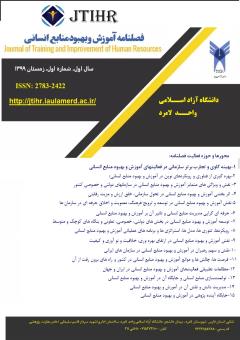Analysis of indicators and components of productive organization with the approach of empowering employees in educational and research organizations
Subject Areas : title1Eshrat Karami 1 , Abdul Khaliq Gholami 2 * , Serajoddin Mohebbi, 3
1 - PhD student, Department of Human Resource Management, Qeshm Branch, Islamic Azad University, Qeshm, Iran
2 - Department of Management, Yasouj branch, Islamic Azad University, Yasouj, Iran
3 - Department of Management, Qeshm Branch, Islamic Azad University, Qeshm, Iran
Keywords: Education, productivity, empowerment, human resources,
Abstract :
Productivity is one of the indicators of managerial performance and the purpose of this research was to analyze the indicators and components of a productive organization with the approach of empowering employees in educational and research organizations (case study: Education and Farhangian University of Fars Province). This research is practical in terms of purpose and the data was collected in the field and in a mixed way (qualitative and quantitative). The statistical population in the qualitative section was 21 experts who were selected purposefully, and in the quantitative section, there were managers and human resources experts, who were first selected by stratified random method, then 384 non-randomly available people were selected as samples. The research tool was a researcher-made questionnaire. The validity of the questionnaire was confirmed by 10 university professors and its reliability was confirmed by Cronbach's alpha test (α=0.86). SPSS version 23 and Lisrel software were used for data analysis. Based on the findings, 74 indicators in the form of 18 components in the dimensions of management, education, innovation and technology, environment and motivational factors have an effect on the productivity of education and Farhangian University of Fars province. Also, the findings showed that the extracted qualitative components have a direct and significant effect on the productive organization model in education and Farhangian University. The development of strategic thinking, organizational incentives, attention to educational justice and continuous evaluations are effective in the development of organizational productivity in education and Farhangian University.

